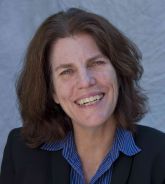Education on the Edge Lecture to Explore How Big Data Can Transform Learning
The first Education on the Edge lecture of the year on Thursday, Feb. 18, at California State University, Northridge will explore how technology, big data and students’ ever-changing learning needs are transforming learning and how students should be taught.

Candace Thille
Candace Thille, founding director of the Open Learning Initiative at Carnegie Mellon University and Stanford University, will talk about how educators can use open, web-based courses and technology to improve the educational outcomes for students with diverse learning needs. Her lecture, “Technology, Big Data and Student Learning Needs: Transforming Education,” is scheduled to take place at 7 p.m. in the University Student Union’s Northridge Center, located on the east side of the campus at 18111 Nordhoff St. in Northridge.
“CSUN’s Center for Teaching and Learning is always looking for recommendations for strong speakers on cutting-edge educational topics for our Education on the Edge series,” said Wendy W. Murawski, executive director and Eisner Endowed Chair of the Center for Teaching and Learning. “Imagine how excited we were when CSUN’s own president, Dr. Dianne F. Harrison, recommended Candace Thille to us! President Harrison said that she had recently heard Dr. Thille speak and thought that every faculty member at CSUN should hear her message about how students learn and how that can impact our own teaching.”
Thille’s focus of research and development is in applying results from the learning sciences to the design, implementation and evaluation of open, web-based learning environments.
The Open Learning Initiative, which Thille first built at Carnegie Mellon, was originally designed to make courses freely available to non-enrolled learners. It also created software that would adapt to the individual needs of students. When the program was used, researchers found that students who used the open-learning program scored just as well as those who attended weekly lectures and a lab.
Those results prompted a re-examination of the initiative. In recent years, it has been used to help liberal arts colleges better educate academically underrepresented students or free up classroom time for other purposes. In addition, the software is being developed to meet the needs of particular educational communities. Thille’s work at Stanford expands on what she was doing at Carnegie Mellon.
Thille also serves as a redesign scholar for the National Center for Academic Transformation; as a fellow of the International Society for Design and Development in Education; on the Assessment 2020 Task Force of the American Board of Internal Medicine; on the technical advisory committee for the Association of American Universities STEM initiative; and on the Global Executive Advisory Board for Hewlett Packard’s Catalyst Initiative. She served on a U.S. Department of Education working group, co-authoring the “National Education Technology Plan,” and on the working group of the President’s Council of Advisors on Science and Technology that produced the “Engage to Excel” report for improving STEM education.
The Education on the Edge series is free and open to the public. However, reservations are required. For more information and to reserve a seat, visit www.CTLthille.eventbrite.com.
CSUN’s Center for Teaching and Learning is the research, collaboration and professional development arm of the Michael D. Eisner College of Education. Faculty from departments across the college are conducting cutting-edge research and professional development to better address the needs of schools, as they work in collaboration with K-12 teachers and administrators and community members.
The center was established in the summer of 2002, thanks to a generous gift from the Eisner Foundation, the family foundation of Michael and Jane Eisner. The center initially focused on neurodevelopment and how knowledge of those constructs can be taught to teachers — and ultimately impact the way they teach and the way students learn. It has since broadened its scope. Faculty and affiliates are researching and analyzing multiple innovative approaches to teaching, counseling, educational therapy, administration and professional development. The center also offers a speakers bureau that provides local schools and organizations an opportunity to bring these new approaches to their campuses. More information about the center can be found at www.csun.edu/ctl.

 experience
experience